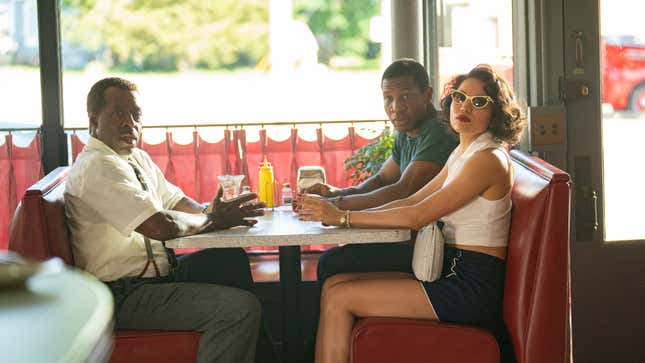
Welcome to Lovecraft Country...or um, you know...welcome to America for Black folks.
Based on the Matt Ruff novel of the same name, Lovecraft Country follows Atticus “Tic” Freeman (Jonathan Majors) who takes a road trip from Chicago across 1950s Jim Crow America to find his missing father Montrose (Michael Kenneth Williams). His childhood friend Letitia, a.k.a. Leti (Jurnee Smollett) and uncle George (Courtney B. Vance) join him on the mysterious and arduous journey that reveals darker secrets inspired by H.P. Lovecraft’s book.
In this gripping and thrilling adaptation, historic themes and horror elements meet as a stark reminder and reflection of America. The vast imagination of Tic is realized in the grotesque and gore-filled monsters that haunt the mysterious town. However, as a Black viewer, you have to ask: Are these creatures the scariest monsters of them all? Or is it really the white people sprinkled throughout the Jim Crow South, or the well-meaning white people...or just…white supremacy, period?
Along with getting a sneak-peek of the first-half of Lovecraft Country, I sat down (virtually) with Majors, Smollett and show creator-showrunner Misha Green to discuss the show’s themes and how extremely relevant they are. This may be a period piece, but there’s nothing about this show’s thesis that’s outdated...period.
“It feels like that Black people, by definition of being Black, have more skills to survive in a horror movie,” Green told The Root.
Though producer Jordan Peele receives top billing in a lot of the press/promotion for the film due to his notability within the genre, I (and others) can’t stress enough how important it is to highlight Green here as the show creator, writer and showrunner for this upcoming series. It’s been three-and-a-half years since Green first wrote the script, and wearing these multiple hats in a leading role comes with its own types of challenges. A standout challenge is, of course, the daily challenge of living as a Black woman—who also happens to be a Black creator of a much-anticipated series tackling very important and relevant themes regarding race.
“I walk through this world not only as a Black person, but as a woman, too,” Green added. “It’s literally, you’re in a horror movie [with] monsters at every turn. I think that the awareness of that has become more [clear] for more people than just the people who had to be aware of it before. Everybody’s like, ‘is it really that hard for you?’ And I’m like, ‘absolutely!’ It’s a feat, this show...where it is today...It’s a feat! I don’t know how I did it. I probably had to disassociate to do it [and] to make it happen this way. It’s everywhere. [...] It’s the experience of being ‘the other’ in America...and I think probably [even extending to the] world that it’s a horror story.”
“I think there are ghosts,” Majors mused to The Root. “Then you have your guardian angel, right? There’s a haunting ghost. It kind of sits with you. As you move more into the world, [that is something that] really pushes into your insecurities. You know, the fact that you do not fit the model—I’m speaking as an actor here—you don’t have blond hair and blue eyes...you carry weight. Your emotion comes in a way that is not recognizable in some forms and not accepted into mediums. My rage and my anger may be detrimental to my safety, you know? And that ghost is just a society that I grew up in...that we all grew up in and that’s an invisible ghost, you know.”
“Also, the physical is literally walking down the road,” Majors continued. “I’ve got two dogs and I don’t drive. So I’m always vulnerable as I move through the street. You know, you can see that’s a six-foot Black man. And he looks the way he looks and sounds the way I sound. It’s not all of them...it’s not every single person. But every now and again, you get some guy who looks at you...and you can always tell the type...you know, in trouble. And they have a certain power to them that they did not earn.”
One of the titillating aspects of horror as an audience member is that push-and-pull dance where you’re constantly holding your breath, then the big scare happens, and then you’re able to release that breath. You’re able to exhale. But, wait...there’s more! The tension is a constant force, never letting up. Sounds like living in the horror story known as America, to me. As Black folks, we can never really breathe. We can’t breathe.
As Smollett noted, the inheritance of the systemic racism this nation was built upon is a “blood memory,” and it is in the “fabric” of this country. Black Americans are tired—tired of this real-life horror story and the constant retraumatization that follows. It’s like a sinister syndication.
“What encourages me is there is such a spirit of disruption,” Smollett told The Root. “And my prayer is that we’re not still walking in circles in the wilderness for another 40 years. We don’t we don’t need another Trayvon Martin to remind us of Emmett Till. We don’t need that. We don’t need another Breonna Taylor in order to see that this system is not working and that ‘one-size-fits-all’ actually doesn’t fit all. When we call for defunding of these systems, when we say we need community-led initiatives, it’s because the community is dying and being killed off.”
Lovecraft Country premieres Sunday, Aug. 16 at 9 p.m. ET / 6 p.m. PT on HBO.
Join the discussion! The Root is hosting its first-ever, virtual Root Institute, presented by Target, featuring several of the leading minds in our community talking about politics, culture, health, community building and social impact. Subscribe for updates today!

